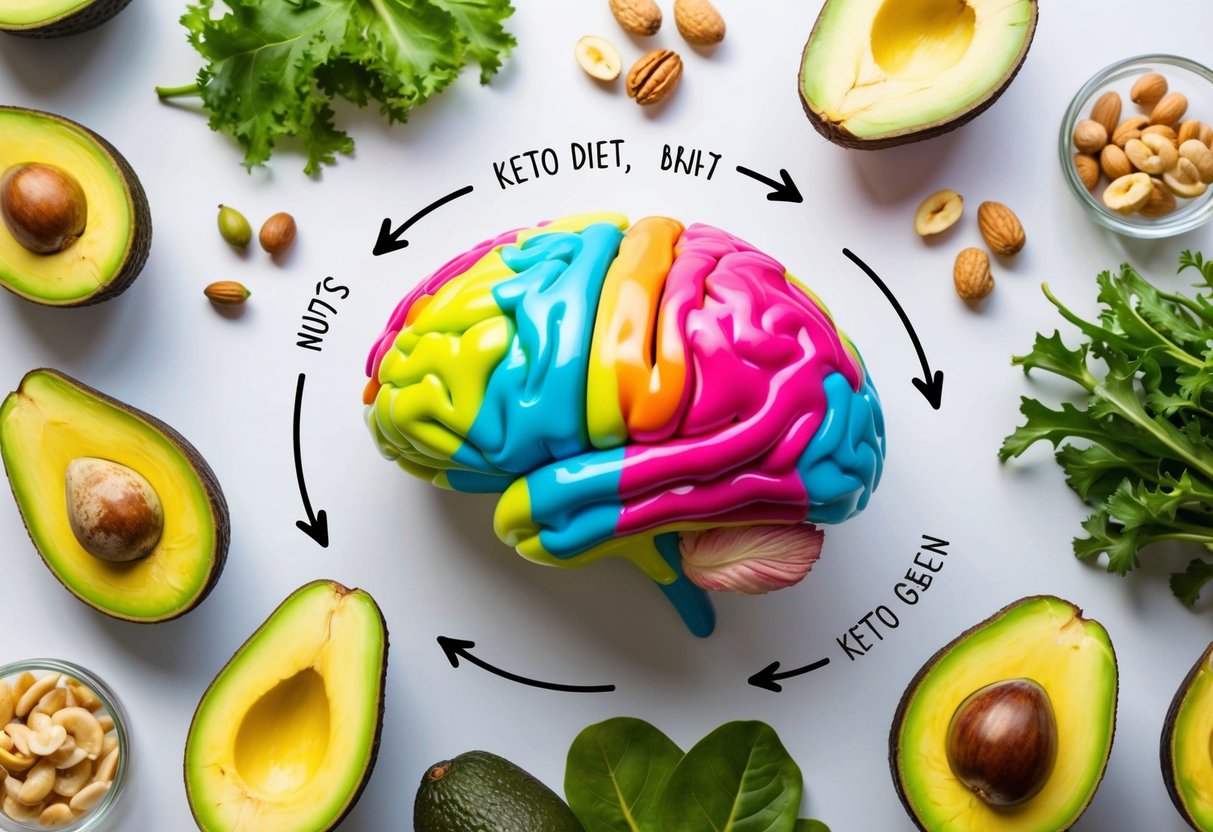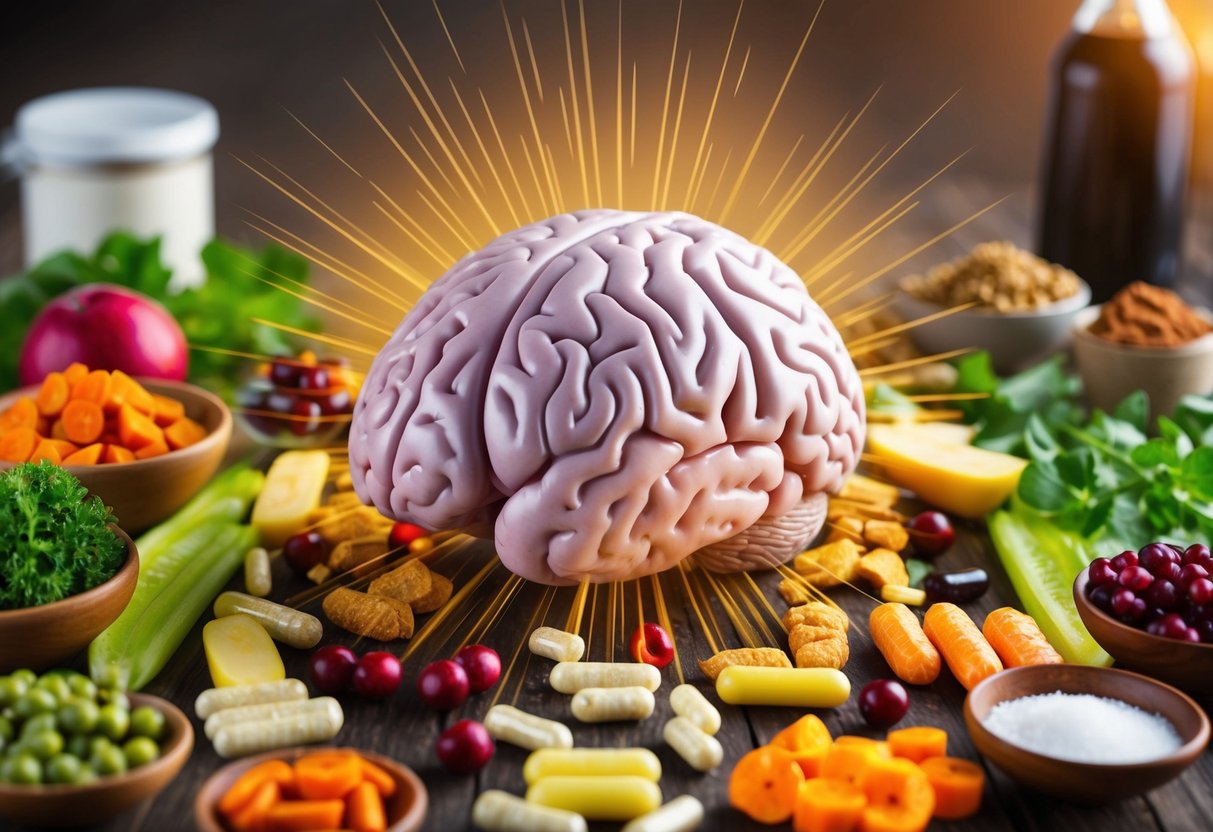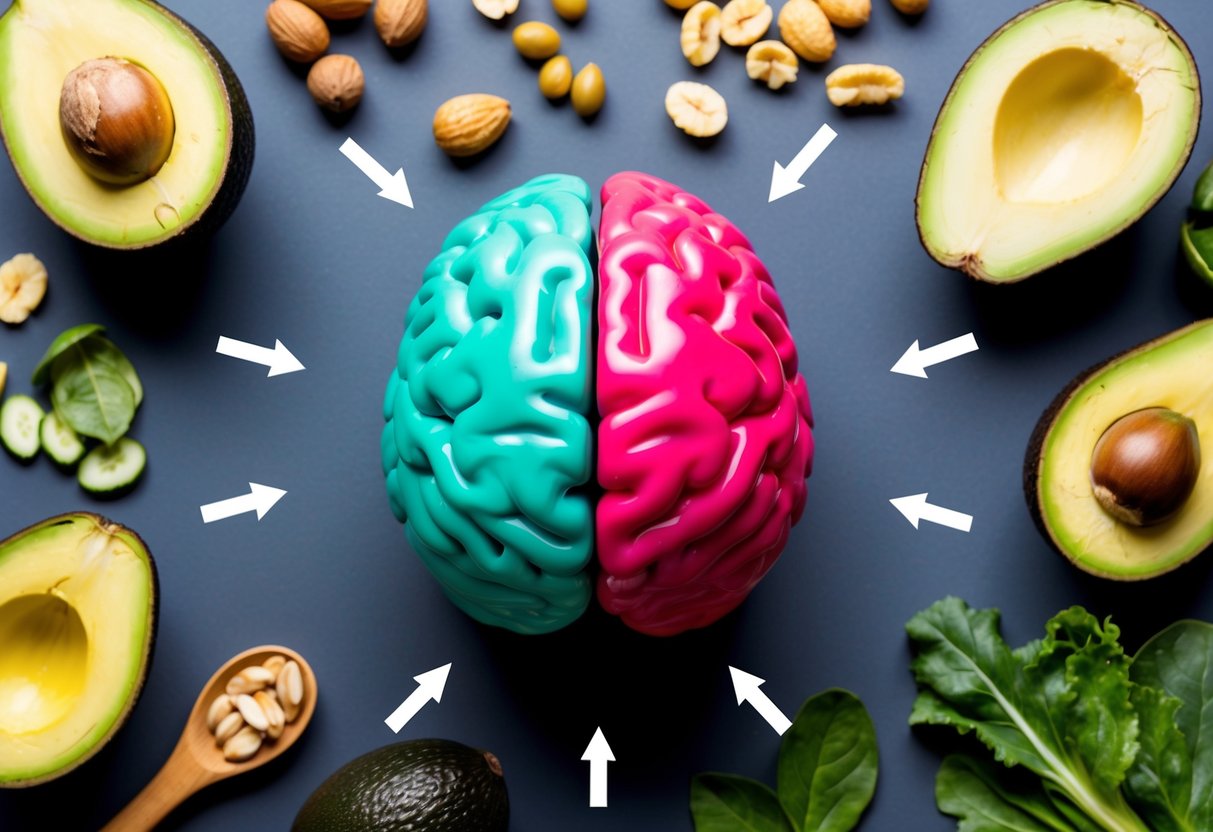Keto for Brain Health: Boosting Memory, Focus, and Cognitive Function
This post may contain affiliate links. If you purchase through these links, I may earn a small commission at no extra cost to you. LEARN MORE.
The ketogenic diet has gained attention not just for its role in weight loss but also for its potential to stimulate brain health.
The brain, despite being only a small percentage of total body weight, consumes a significant amount of the body’s energy.
When the body is in a state of ketosis, it efficiently utilizes ketone bodies as an alternative energy source, which may enhance memory, focus, and cognitive function.
This metabolic shift opens new possibilities for improved mental clarity and brain performance.

Existing research indicates that ketosis could offer protective effects against neurodegenerative disorders like Alzheimer’s and Parkinson’s disease.
By possibly enhancing mitochondrial function and reducing amyloid plaques, the ketogenic diet shows promise for promoting long-term brain health.
Reports of increased alertness and improved cognitive performance further underscore the potential benefits of adopting this nutritional approach.
For those curious about integrating the keto lifestyle, awareness of foods and supplements that can further enhance cognitive function is essential.
Understanding the balance between maintaining ketosis and supporting overall brain health can be an empowering journey.
This article aims to explore how the ketogenic diet may serve as a valuable tool for enhancing mental performance.
New to keto? Check out our Custom Keto Diet Explained for Beginners for a comprehensive start.
Key Takeaways
- Ketosis can enhance memory, focus, and cognitive function.
- The ketogenic diet may protect against neurodegenerative disorders.
- Incorporating brain-boosting foods can support brain health.
Understanding Keto for Brain Health

The ketogenic diet, known for its low carbohydrate intake, prompts the body to enter a metabolic state called ketosis.
In this state, the body relies on ketone bodies, such as β-hydroxybutyrate, as its primary fuel source, benefiting brain health and cognitive function.
Key Concepts and Definitions
A ketogenic diet is characterized by a significant reduction in carbohydrate intake, usually constituting 5-10% of total daily calories.
This leads the body to shift from relying on glucose, derived from carbs, to using fat for energy.
The liver converts fatty acids into ketone bodies: acetoacetate, acetone, and β-hydroxybutyrate.
Ketosis is the metabolic state achieved when ketone bodies supply a major portion of the body’s energy, particularly when carb intake is minimal.
This adaptation can result in weight loss, improved insulin sensitivity, and enhanced brain performance.
The diet’s impact on neurological health has been highlighted in various studies which suggest that it can enhance cognitive functions such as memory and focus.
How Ketosis Fuels the Brain
Ketone bodies, especially β-hydroxybutyrate, play a crucial role in fueling the brain during ketosis.
Unlike high-carb diets, which rely on glucose as the primary energy source, ketosis allows the brain to utilize ketones.
Ketone metabolism supports various cognitive functions by offering a more stable energy supply, potentially improving focus and reducing the risk of neurodegenerative issues.
In a low carb diet, when glucose is scarce, ketones provide an efficient, alternative energy source, leading to potential cognitive enhancements.
Research suggests that ketosis may help protect against neuronal damage and support memory retention, highlighting its importance for sustained brain health.
This could be particularly beneficial for individuals with cognitive impairments or those seeking to boost mental clarity.
Learn more about ketosis in our guide on Keto Diet for Beginners.
Keto and Cognitive Functions

The ketogenic diet plays a notable role in supporting cognitive health. By influencing brain energy metabolism, ketosis can offer potential benefits for memory enhancement, improved focus, and overall cognitive performance.
Enhancing Memory and Focus
The ketogenic diet is linked to improved memory and focus due to the brain’s efficient use of ketone bodies.
Ketones, such as beta-hydroxybutyrate (BHB), serve as an alternative fuel that optimizes brain energy use.
This change can promote better memory consolidation and sharper focus.
In addition, BHB has shown enhancement of neurotransmitter function, leading to improved communication between brain cells.
Enhancements in focus are particularly noted, as ketones provide a stable energy supply, reducing fluctuations that often interfere with concentration.
This reliable energy supports consistent cognitive function and helps mitigate the risks of age-related cognitive decline.
Keto’s Impact on Learning and Cognitive Performance
A ketogenic diet may enhance learning and cognitive performance by influencing brain plasticity and reducing neuronal inflammation.
Such changes potentially aid in maintaining adaptable and resilient cognitive functions.
The diet has been observed in various studies to support mitochondrial function, which is critical for energy production and cognitive health.
Enhancements in this area can result in heightened cognitive performance, especially for tasks requiring sustained mental effort.
Moreover, insulin resistance, a common issue affecting brain function, may be alleviated, indirectly supporting improved learning abilities.
Adopting a keto diet can pave the way for more effective cognitive processing, offering benefits for daily cognitive tasks and reducing the risk of cognitive decline.
Health Benefits Beyond Cognition

The ketogenic diet extends its advantages to various areas, including weight management and supporting metabolic health, as well as enhancing mitochondrial function. These benefits play a significant role in promoting overall well-being and reducing the risk of chronic diseases.
Weight Management and Metabolic Health
A ketogenic diet can effectively support weight management by promoting fat loss.
As the body enters ketosis, it switches from using glucose to utilizing fats as its primary energy source, which can lead to a reduction in body fat.
This metabolic shift often results in improved insulin sensitivity and stabilized blood sugar levels, reducing the risks associated with insulin resistance.
Moreover, this dietary approach often helps maintain stable insulin levels, minimizing spikes that can contribute to fat storage and cravings.
Improved metabolic health due to these effects is critical for reducing the risk of developing type 2 diabetes and other metabolic disorders.
For those looking to improve overall metabolic health and manage weight effectively, a personalized plan like the Custom Keto Diet can offer tailored strategies to enhance these benefits.
Mitochondrial Function and Reduced Oxidative Stress
The ketogenic diet influences mitochondrial efficiency by increasing the production of ketones, offering an alternative energy source that may enhance mitochondrial function.
This, in turn, might help in reducing oxidative stress, a factor linked to various chronic diseases and aging.
By providing a more efficient fuel source, ketones can support the mitochondria in producing energy with fewer harmful byproducts.
This reduction in oxidative stress is essential for maintaining cellular health.
Additionally, improved mitochondrial function is associated with heightened energy levels and better overall physical health, contributing to diminished potential damage caused by free radicals.
Keto Diet in Neurological Conditions

The ketogenic diet shows promise for neurological health. It aids in seizure management for epilepsy and offers potential neuroprotective effects for neurodegenerative disorders like Alzheimer’s and Parkinson’s.
Managing Seizures in Epilepsy
A ketogenic diet has long been used to help manage seizures in individuals with epilepsy.
High-fat, low-carbohydrate intake leads to increased production of ketone bodies. These molecules serve as an alternative energy source for the brain, reducing neuronal excitability that can trigger seizures.
For individuals with epilepsy resistant to traditional medications, the ketogenic diet may offer an effective alternative.
Studies have reported a reduction in seizure frequency and severity among adults and children on the diet.
Regular monitoring by healthcare professionals is essential to manage any side effects and ensure nutritional balance.
Neuroprotective Benefits for Neurodegenerative Diseases
The ketogenic diet also shows potential in offering neuroprotective benefits for neurodegenerative diseases.
Research suggests it may provide cognitive benefits for conditions such as Alzheimer’s and Parkinson’s disease by lowering amyloid plaque buildup and oxidative stress.
In the context of Alzheimer’s disease, ketone bodies may enhance cerebral circulation and metabolic functions, thereby slowing cognitive decline.
In Parkinson’s disease, the diet might help improve motor function and reduce neuroinflammation.
More research is needed, but existing studies support the ketogenic diet as a viable adjunct to conventional treatments, potentially mitigating symptoms of dementia and mild cognitive impairment.
Lifestyle Integration and Practical Considerations

To successfully integrate a keto diet into daily life, combining it with intermittent fasting can enhance cognitive benefits. Prioritizing quality sleep and hydration is essential to optimize brain health.
Incorporating Intermittent Fasting and Diet Sustainability
Intermittent fasting, when combined with a ketogenic diet, may improve mental clarity and focus.
This eating pattern can help in regulating insulin levels and increasing ketone production, which fuels the brain efficiently.
Common approaches include the 16/8 method, where individuals fast for 16 hours and eat within an 8-hour window.
Sustainability is crucial.
It’s important for individuals to adjust their fasting and eating schedules based on personal preferences and health goals.
Flexibility and understanding one’s body signals are key to maintaining this lifestyle long-term.
Incorporating nutrient-dense, high-fat foods ensures a balanced approach that complements cognitive function support.
For more detail, follow our guide on How Intermittent Fasting Works with Keto to Accelerate Fat Loss
Optimizing Brain Health with Sleep and Hydration
Adequate sleep is vital for cognitive performance. It supports memory consolidation and mental alertness.
The keto lifestyle can influence sleep quality, so maintaining consistent sleep routines and creating a restful environment is beneficial.
Hydration is another critical factor in maintaining brain health.
Staying well-hydrated supports cognitive processes and overall brain function.
It’s essential to drink enough water daily, especially when following a keto diet, as ketone production can lead to increased fluid loss.
Prioritizing sleep and hydration works synergistically with the ketogenic diet to support mental acuity and overall health.
Brain-Boosting Foods and Supplements
Diet plays a critical role in optimal brain function. Specific foods and supplements can enhance memory, focus, and overall cognitive health.
Essential Brain-Boosting Foods on a Keto Diet
A ketogenic diet emphasizes low-carb, high-fat foods, many of which are excellent for cognitive health.
Fatty fish, such as salmon and mackerel, are high in omega-3 fatty acids, which support brain cell structure.
Leafy greens like spinach and kale are rich in antioxidants and vitamins, offering protection against cognitive decline.
Nuts and seeds are another staple, providing healthy fats and essential minerals like magnesium.
Eggs are valuable for their choline content, which is crucial for brain health.
Additionally, avocados supply monounsaturated fats that optimize blood flow to the brain.
These keto-friendly options can easily be incorporated into daily meals.
Top Supplements for Enhancing Cognitive Function
For those following a ketogenic diet, certain supplements can further enhance brain function.
MCT oil is popular for quickly converting into ketones, providing an immediate brain energy source.
L-theanine, often combined with caffeine, can improve attention and reduce anxiety.
Supplements like Ginkgo biloba and Bacopa monnieri have been recognized for their potential in improving memory and cognitive speed.
Omega-3 supplements are beneficial for individuals who might not consume enough fatty fish.
Finally, magnesium is essential for neurotransmitter function and can aid in maintaining mental stability and reducing stress.
Check out these best selling supplement for keto diet from Amazon below.
Frequently Asked Questions
The ketogenic diet’s influence on brain health encompasses various aspects including cognitive function, memory, focus, and neuroprotection. It has been studied for its potential benefits in these areas.
What effects does ketosis have on cognitive function?
Ketosis may improve cognitive function by providing the brain with a stable source of energy in the form of ketones.
These alternative energy substrates can enhance efficiency compared to glucose, potentially supporting better cognitive performance.
Can the ketogenic diet contribute to brain repair and neuroprotection?
The ketogenic diet may promote brain repair and offer neuroprotective effects.
By enhancing mitochondrial function and reducing oxidative stress, it can help protect brain cells from damage, which might lower the risk of neurological diseases like Alzheimer’s and Parkinson’s.
How might a keto diet impact memory and focus compared to a high-carb diet?
A ketogenic diet has been associated with improvements in both memory and focus.
It may enhance short-term and long-term memory by providing stable energy to the brain.
In contrast, a high-carb diet may lead to fluctuations in energy levels, potentially affecting concentration.
Are there cognitive benefits to using ketones as the brain’s energy source?
Ketones serve as an efficient and effective energy source for the brain.
They may improve neurotransmitter function and support brain health, potentially leading to cognitive benefits such as improved clarity, alertness, and mental performance.
Does following a ketogenic diet alleviate symptoms of brain fog?
Many individuals report that a ketogenic diet helps alleviate brain fog by promoting stable energy levels and reducing blood sugar fluctuations.
This dietary approach may lead to clearer thinking and better mental clarity compared to diets high in carbohydrates.
What are the long-term implications of a ketogenic diet on overall brain health?
Long-term adoption of a ketogenic diet may support brain health by reducing inflammation and oxidative stress.
These effects can protect against age-related cognitive decline and promote overall brain health, potentially offering benefits against neurodegenerative conditions.
Conclusion
A ketogenic diet offers several potential benefits for brain health. By shifting energy use from carbohydrates to ketones, this dietary approach may enhance cognitive function, improve memory, and sharpen focus.
The presence of ketones, especially beta-hydroxybutyrate (BHB), is notable for boosting brain function. Studies suggest it may help protect against age-related cognitive decline by supporting mitochondrial function and reducing harmful plaque buildup.
Many individuals report improved mood and alertness while following a ketogenic diet. These effects can contribute to better overall cognitive performance and mental clarity.
The connection between brain health and ketosis extends to gut health as well. The gut-brain axis indicates a relationship where a well-functioning gut supports optimal brain health.
Want to learn how keto supports gut health? Check out our in-depth guide for more details! Read Now
Benefits of Ketosis for Brain Health:
- Improved memory and focus
- Protection against cognitive decline
- Enhanced mood and clarity
Transform your cognitive function with a customized approach. Discover the Custom Keto Diet and boost your brain power today!





